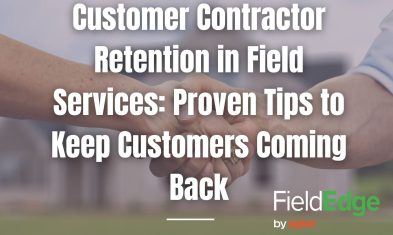Running a field service company is exciting, but scaling a field service business requires more than just booking more jobs. Scaling means building systems, processes and tools that let you service more customers without burning out your team or sacrificing quality.
For any established service businesses in HVAC, plumbing, electrical and other trades, smart scaling is what separates long-term success from short-term hustle.
In this guide, you’ll explore:
- What scaling a field service business really means
- Why scaling is critical in today’s competitive market
- Strategies to expand without losing quality
- Technology tools that make scaling easier
- The KPIs you should track to measure success
What Does Scaling a Field Service Business Mean?
Growing and scaling aren’t the same thing:
- Growth = hiring more techs, buying more trucks and adding overhead to keep up with demand.
- Scaling = generating more revenue without significantly increasing costs, thanks to smarter systems and technology.
Think of it this way: growth adds weight, scaling adds efficiency.
Industry Insight: Only 22% of new businesses successfully scale in their first 10 years. But the ones that do create two-thirds of total business value.
With the field service market expected to increase from $5.64B in 2025 to $9.68B by 2030, now is the time to position your company to capture that opportunity.
Why Field Service Companies Must Focus on Scaling
Today’s customers expect:
- Fast response times
- Real-time job updates
- Techs who arrive fully prepared
But nearly 50% of small businesses fail after five years, often because they try to expand too quickly without the right foundation. Scaling ensures you can deliver consistently great service while adding more customers.
Key Strategies for Successful Scaling
1. Systemize Operations
When scaling a field service business, you can’t be involved in every decision. You need to build systems that keep quality high without micromanagement:
- Step-by-step SOPs for recurring jobs
- Standardized checklists for quality control
- Empowered managers who can make on-site decisions
- Automation for scheduling, invoicing and dispatch
2. Leverage Field Service Software
The right technology is the backbone of scaling. Field service management software helps you with:
| Tool | How It Helps | Impact on Scaling |
| Mobile Apps | Techs access job details, customer history and parts inventory in the field | Faster service, fewer return visits |
| GPS-Based Scheduling | Automatically assigns jobs by location/skills | Less drive time, more jobs per day |
| Customer Communication | Automated reminders and updates | Reduced no-shows, happier customers |
| Inventory Management | Real-time parts and supplies | No costly delays or extra trips |
| Reporting Dashboards | Instant business performance insights | Data-driven scaling decisions |
Pro Tip! FieldEdge helps businesses like yours scale by connecting scheduling, dispatching, invoicing and customer management in one seamless platform.
3. Focus on First-Time Fix Rates
Efficiency drives scalability. To improve first-time fix rates:
- Equip techs with the correct parts and tools upfront
- Provide access to service history and manuals
- Train staff thoroughly on core jobs
- Maintain strong office–field communication
4. Hire and Train the Right People
Scaling isn’t about hiring fast—it’s about hiring smart.
- Hire for culture fit and long-term potential
- Build structured training programs
- Cross-train technicians to handle multiple job types
- Strengthen your back office team to support techs
Fact: High-performing employees are up to 400% more productive and in complex roles, 800% more. Invest in your people—they’re your most scalable asset.
Common Mistakes to Avoid When Scaling
- Expanding Too Fast: Overcommitting hurts reputation.
- Neglecting Current Customers: Keep loyal clients happy.
- Skipping Technology: Manual processes won’t scale.
- Not Tracking Metrics: You can’t improve what you don’t measure.
Metrics to Track When Scaling a Field Service Business
How do you know if your scaling efforts are working? Track these KPIs to know if you’re scaling smart:
- Revenue per Technician: Should rise as efficiency improves.
- Customer Retention Rate: Aim for 80-90%.
- Average Job Time: Faster completions without sacrificing quality.
- Profit Margins: Revenue should outpace costs.
- Customer Satisfaction Scores (CSAT/NPS): Happy customers = referrals.
The Role of Field Service Software in Scaling
The best field service software helps established field service businesses scale by providing:
- Streamlined scheduling & dispatching
- Mobile tools for field techs
- Automated invoicing & payment collection
- Real-time reporting dashboards
- Enhanced customer communication tools
- Improved customer communication
With FieldEdge, you can handle more jobs with the same team—that’s real scaling.
Ready to scale your field service business? See how FieldEdge can instantly streamline your operations. Book your personalized demo today!
Your Path to Sustainably Scaling a Field Service Business
Scaling a field service business isn’t about working harder—it’s about working smarter. By investing in people, processes and technology, you can build a foundation that supports long-term, profitable expansion.
Key Takeaways:
- Scaling = serving more customers without proportionally increasing costs
- Systems and software are essential for efficient expansion
- Track KPIs to ensure you’re scaling effectively
- Invest in your team for sustainable success
- Keep your existing customers happy while adding new ones
Ready to start scaling your field service business? See how FieldEdge can help you streamline operations, improve efficiency and scale sustainably. Book a demo today!
Related: LATEST Field Service Trends




